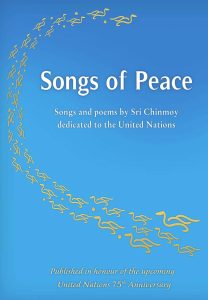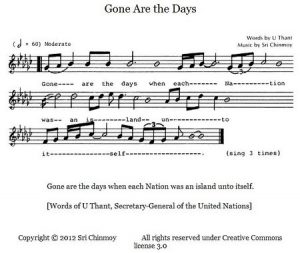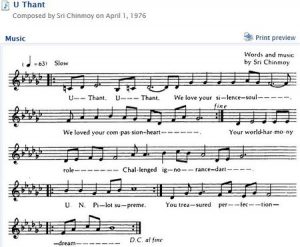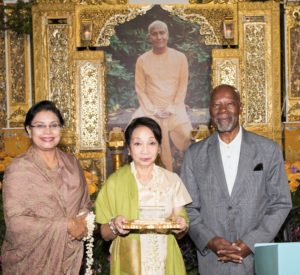
Daw Aye Aye Thant (second from left) displays the Sri Chinmoy Culture-Light Award she just received, as previous recipients Rezwana Choudhury Bannya (far left) and Ambassador Davidson Hepburn look on.
On 10 October 2017, Daw Aye Aye Thant, daughter of the third UN Secretary-General, U Thant, and President of the U Thant Institute, received the Sri Chinmoy Culture-Light Award. Also present were two special guests, who were both previous recipients of the Culture-Light Award.
Offering some reflections on U Thant was H.E. Ambassador Davidson Hepburn, President of the 35th General Conference of the UN Educational, Scientific and Cultural Organization (UNESCO, and Former Permanent Representative of the Bahamas to the United Nations.
Ms. Rezwana Choudhury Bannya, a well-known recorded singing artist of both India and Bangladesh; a noted authority on songs by Rabindranath Tagore and director/founder of Shurer Dhara academy in Dhaka, performed songs by Sri Chinmoy and Tagore.
The Award honoured both Aye Aye and her father, posthumously, and was presented at Aspiration-Ground meditation garden in Queens, as part of the ten-year observance of Sri Chinmoy’s passing.
In presenting the award, Ranjana K. Ghose, President of the Sri Chinmoy Centre. said that it was particularly meaningful and appropriate to bestow this award on Aye Aye and her father jointly as they shared a vision and have worked together in so many ways. She thanked Aye Aye for the significant role she was playing to bring about world peace through the light of culture.
In her acceptance remarks, Aye Aye said, “I am grateful for this opportunity to help me resurface my mission and to reflect on my father’s vision which has always been my cherished pride. Thank you for giving me an opportunity to share with you. If and when I get more opportunities, I shall continue to help shine the light of my father in his quest for peaceful world.”
During the programme, the Singers performed songs by Sri Chinmoy dedicated to U Thant and peace. As well, Nilima Silver, Programme Coordinator of The Peace Meditation at the United Nations, offered the guests copies of Songs of Peace, songs and poems by Sri Chinmoy dedicated to the United Nations.
Presentation of the Award
In presenting the award, Ranjana Ghose remarked: “Sri Chinmoy felt very affectionate towards Aye Aye. Although her life toils kept her in many different places – and Sri Chinmoy’s similar toils kept him, as we all know, visiting many countries around the world,. there was an interconnection that was growing. Sri Chinmoy had deep regard for U Thant and Aye Aye and would often inquire if Aye Aye had started her own non-profit organization. He felt she would be very gifted at this and that it would further her work for world peace and bringing equality and education to the women of Myanmar and other places. Aye Aye is a tremendous humanitarian In heart and in deed. We felt it was particularly meaningful and appropriate to bestow this award on Aye Aye and her father jointly as they shared a vision and have worked together in so many ways.
“The Sri Chinmoy Culture-Light Award is intended to honour those who bring light to the human mind through culture using the written word, photography, cinematography, musical performance, or any other manner of the Fine Arts. These expressions symbolize the creative spark, ignited by the Divine, to help illumine humanity. Illumining the mind of humanity is a significant way to bring more peace and harmony to the world. The experience of culture can increase the light of understanding. Communicating higher ideals educates, and can clarify perceptions or mental states. Illumining thoughts can lessen fear of the unknown. All such efforts help to increase tolerance and a more peaceful coexistence. They potentially reduce friction and tension among individuals and communities. The Goal is a more compassionate, accepting and understanding society, one which is more caring and supportive of higher ideals and beneficial mores.
“We give great value to those idealistic members of Society such as Aye Aye Thant. They focus on higher Ideas and act as a catalyst for society to evolve. For this role of catalyst in society, we would like to bestow upon you the Sri Chinmoy Culture-Light Award. As Sri Chinmoy was, you too are an educator of people. Similar to your father, you endeavor to bring about harmony among the people of the world. Sri Chinmoy said we are all needed to establish world harmony here on earth. We are all needed for peace.
“We thank you for the significant role you played and are playing to bring this about. Aye Aye Thant and U Thant, you endeavour towards peace and world harmony through the light of culture. Therefore we offer you the Sri Chinmoy Culture-Light award.
“The etching on the Crystal award is from a World Harmony painting by Sri Chinmoy.
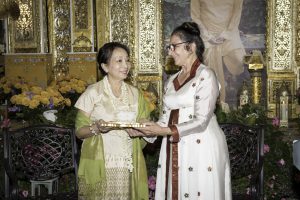
Ranjana Ghose, President of the Sri Chinmoy Centre, bestows the Sri Chinmoy Culture-Light Award on Daw Aye Aye Thant, daughter of third UN Secretary-General U Thant.
Titled Unity, this series of paintings is comprised of the iconic birds of Sri Chinmoy — sometimes referred to as birds of inspiration, sometimes referred to as birds of aspiration, sometimes as the soul Birds, the song birds, birds of beauty, birds of light, the bird as an analogy for the soul. Sri Chinmoy Culture-Light, honouring, encouraging, recognizing the spreading of peace, the flight of the bird, through the Fine Arts, through music, through the written word, through performance, through the message of heightened ideals, manifest in our thought, word and deed, as a conscious offering to humanity. The Sri Chinmoy Culture-Light Award recognizes your contribution to the betterment of the world’s family, and we thank you for doing so.”
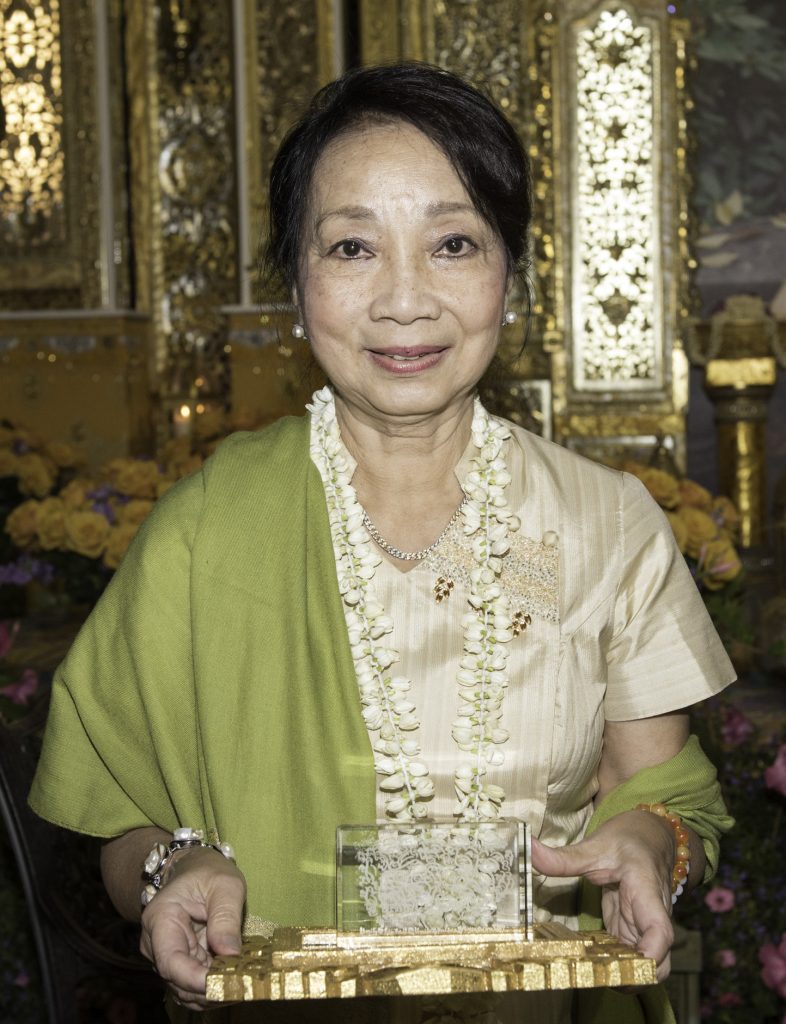
Daw Aye Aye Thant displays the Culture-Light Award, with Sri Chinmoy’s soul-birds etched into crystal.
Remarks by Daw Aye Aye Thant
In accepting the Award, Daw Aye Aye Thant remarked, “May I thank Ranjana, Ambassador Hepburn and friends from the Sri Chinmoy Center for inviting me here tonight and for presenting me with the Sri Chinmoy Culture-Light Award, along with my esteemed beloved Father, U Thant. It is a great honour for me to accept the Award and to be among so many notable individuals. I take great pride in accepting it and do so in my Father’s memory as well.
“As I understand it, the Award recognizes those who contribute to the betterment of the world-family. The Award reflects Sri Chinmoy’s lifelong contribution to peace and harmony in the world.
“No questions would be asked about my Father’s contribution to the betterment of the world-family. All throughout his adult life as a journalist, writer, headmaster at the National school in his home town, a government official, an ambassador to the United Nations and as Secretary-General of the United Nations, he had advocated for education to help illuminate the mind of humanity. He felt so strongly that the aim of our education system should not only be to emphasize the development of the intellect, but should also emphasize
‘the development of moral and spiritual qualities including tolerance, patience, humility, the philosophy of live and let live and the desire to understand the other person’s point of view.’
“Those are his words and although it has been almost 43 years since he passed, I can still hear them inside me.
“After he passed, I felt so strongly that his vision for peaceful co-existence and the need to make the world safe for diversity was more timely now than ever before. Sadly that need is still overwhelming. I have felt that it is my mission even in a small way to keep the vision of my father alive. He had said, ‘We have to learn to understand each other and to develop a spirit of One World’. We seem to have failed in understanding the scope of that in relationship to world peace and individual well-being.
“Inspired by his vision, I founded the U Thant Institute to promote the spirit of cooperation, mutual understanding and friendship. Reflecting my father’s values and visions, the U Thant Institute organized events with speakers addressing current issues and problems facing our world.
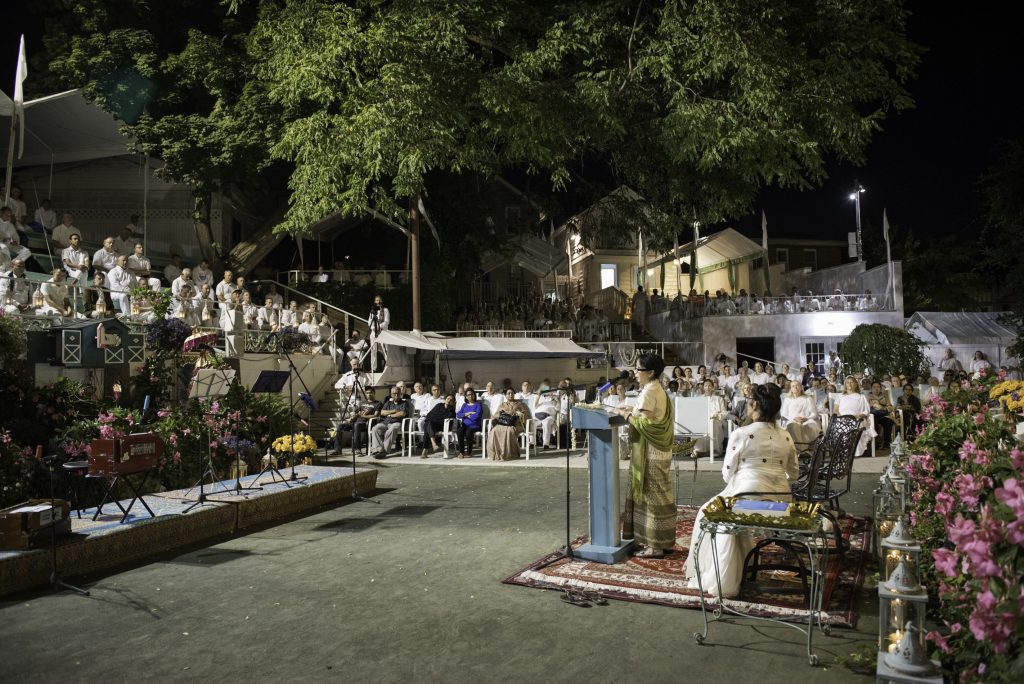
Daw Aye Aye Thant offers remarks after accepting the Sri Chinmoy Culture-Light Award.
“When my husband and I went back to Myanmar in 2011, together with our son Thant Myint-U and with the support of the Government we opened the U Thant House Museum. There, we continued the mission to share my father’s vision for world peace with a permanent exhibition of his life and work, spanning from his early life through his later life in New York. The exhibit includes photographs, audio-visual recordings, letters to and from world leaders, books, and other mementos. Lectures and seminars on education, religious and cultural understanding are organized and there is also a small Library where copies of his writings and papers are displayed as a resource for scholars and students.
“I am grateful for this opportunity to help me resurface my mission and to reflect on my father’s vision which has always been my cherished pride.Thank you for giving me an opportunity to share that with you. If and when I get more opportunities I shall continue to help shine the light of my father in his quest for a peaceful world.
“Thank you for the honour.”
Remarks by Ambassador Davidson Hepburn
After Daw Aye Aye Thant spoke, Ambassador Hepburn made the following remarks: “Good evening, dear friends. Unfortunately I did not have the pleasure of meeting the former Secretary-General U Thant. I came to the United Nations the year of his passing, 1974, so I did not have the opportunity to personally meet him. But I did attend a memorial service that was held for him at the United Nations.
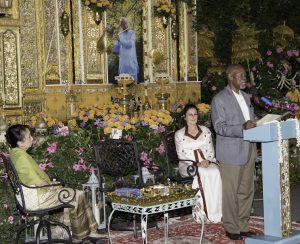
Ambassador Davidson Hepburn offers some insights into the third UN Secretary-General, U Thant.
“I always knew that he was an innovator. I am going to give you three points that I feel will tell you more about him. First, Secretary General U Thant supported UN SDGs long before they were called “Sustainable Development Goals”. He was man who was dedicated to Education (and SDG Goal 4 is Quality Education). He had a commitment to all aspects of universal peace before it was called ‘the Culture of Peace.’
“Secondly, the work of Aye Aye and the U Thant Institute have kept his vision alive. With the unique understanding of her father’s expanding vision she has encouraged all. Her wonderful dedication and personal example admired by so many is a highlight of the award. These continuing efforts are invoking more culture and more light — so needed in this world today.
“Thirdly, this beautiful Aspiration Ground is a most appropriate setting. Here light is valued and culture is valued. Here artists share soul-stirring compositions. Here we observe great attention to the details that create and maintain a beautiful sacred space and atmosphere. This is always a wonderful place to come for peace and meditation and relaxation. On entering this place one feels culture, one feels light, one feels peace and most of all, one feels oneness.
“So obviously, U Thant, Sri Chinmoy, and Aye Aye all share a profound love of oneness and spirituality as a natural part of peace-building. Thank you.”
Note: In the morning, Ambassador Hepburn was the keynote speaker at the 11th Anniversary Celebration of the Sri Chinmoy Street and Heart-Garden held in Flushing Meadows Corona Park. Click here for his earlier remarks.
Myanmar Artisans Design Case for Award
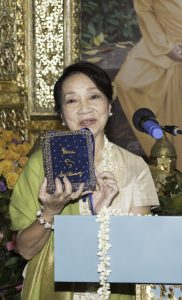
Daw Aye Aye Thant explains about the embroidery on the case for the Award, a specialty of artisans in Mandalay, Myanmar.
Ranjana Ghose mentioned that, during a visit to Myanmar by Sri Chinmoy and his disciples, the box the Award came in was hand-embroidered in Mandalay. Aye Aye Thant explained about the art: “This is a very unique piece of art from Myanmar. Actually, it is only in the city Mandalay that they make this kind of embroidery. So I am so pleased that I received this along with the prize, embroidered with the words ‘Peace’ and ‘Sri Chinmoy’. Thank you so much.”
Ranjana Ghose further elaborated: “The embroidery on this box says ‘Peace’ and ‘Sri Chinmoy’, and it is written in Sri Chinmoy’s handwriting. We gave the embroiderers that particular artwork, one of Sri Chinmoy’s birds. In this case two of the women from our group went to Mandalay, where they do this kind of embroidery, and had these particular boxes made for the Award. The ladies who did the sewing were so proud of their workmanship, and we were so thrilled that they really tried so very hard to do a beautiful job. And they certainly did. The members of our Meditation Group were very touched and moved by the little circle of ladies that worked on the embroidery with such joy. When we were traveling with Sri Chinmoy all those years, we would give local ladies some business when we came to visit a place. This business can mean a lot to these woman who are in sewing circles, to be able to make this extra money. It is so hard for a woman in many parts of the world to get an income. We found that local sewing was a way to support them. In one place in Myanmar we actually bought some sewing machines and gave them to some of the ladies in the marketplace. The box may be hard to see if you’re sitting at a distance, but we’ll leave it here for a while so that you can come up if you wish to see and have a glance of it.”
Performance of Sri Chinmoy’s songs dedicated to U Thant and Peace
The Singers then performed two songs composed by Sri Chinmoy dedicated to U Thant, as well as an arrangement of several of Sri Chinmoy’s songs of peace.
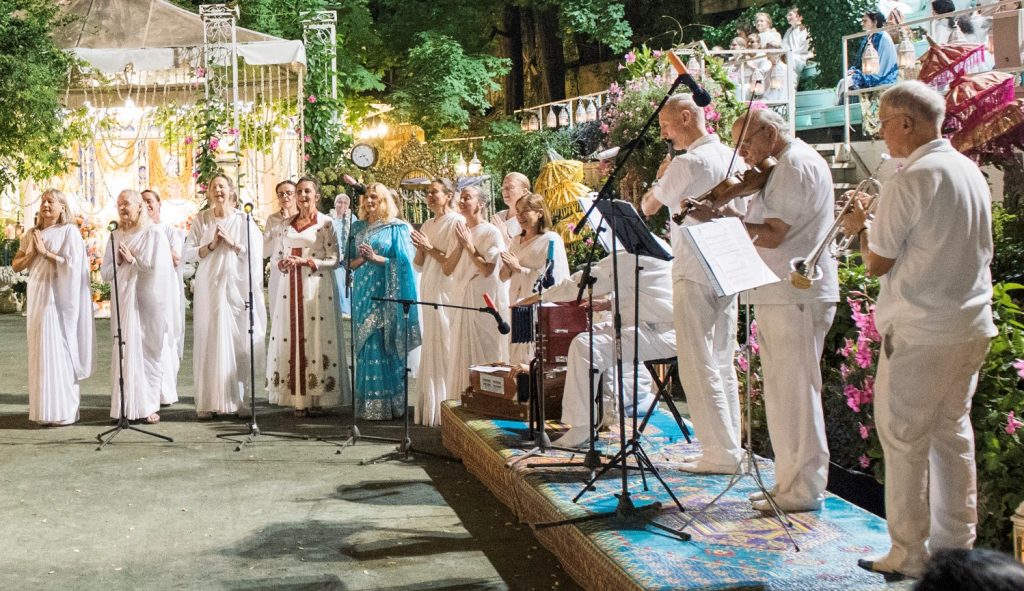
Presentation of the book Songs of Peace
In presenting the book Songs of Peace, Nilima Silver remarked: “As General Secretary of Sri Chinmoy: The Peace Meditation at the United Nations, I have the honour of introducing a very special book.
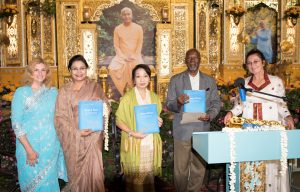
Honoured guests display their copies of Songs of Peace, as presented by Nilima Silver, General Secretary, Peace Meditation Group. From left to right: Nilima Silver; Rezwana Choudhury Bannya; Daw Aye Aye Thant; Ambassador Davidson Hepburn; and Ranjana Ghose.
At the invitation of Aye Aye’s dear father, Secretary-General U Thant, in 1970, Sri Chinmoy began leading meditations for delegates and staff at UN Headquarters in New York. Until his passing in 2007, he offered his multifaceted inspiration to the UN community through these meditations, concerts, art exhibits and other programmes for peace. Sri Chinmoy wrote hundreds of songs specifically about the UN, in both English and his native Bengali, which are often performed at various UN observances. We have collected some of these – including the beautiful songs performed tonight, dedicated to U Thant and peace – as well as a selection of Sri Chinmoy’s writings about the UN, into a book entitled Songs of Peace. The first edition of this book was presented to the UN Library at the UN Office in Geneva in June 2017, when the UN held an Art Exhibit of Sri Chinmoy’s paintings there. This is the second edition of the book, and we would like to present it to our honoured guests at this time.”
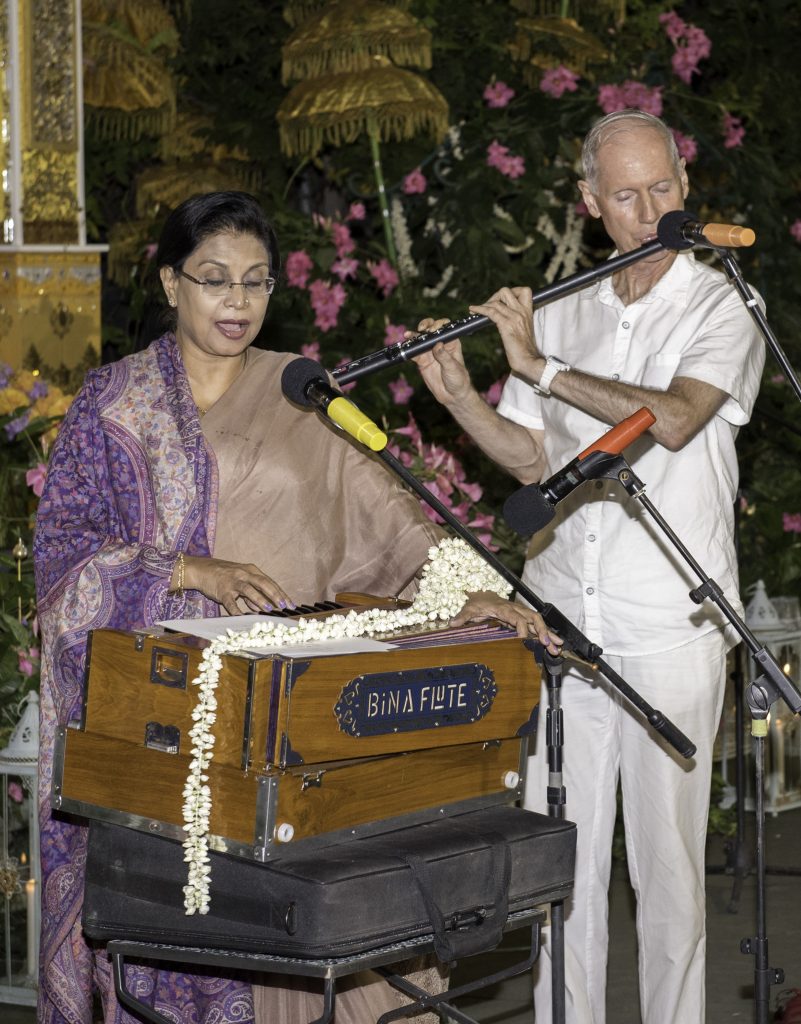
Rezwana Choudhury Bannya performs songs by Sri Chinmoy and Tagore, accompanied by Premik Russell Tubbs on flute.
A Thank You from Daw Aye Aye Thant
Following is an excerpt from a kind message received from Daw Aye Aye Thant after event: “Dear Friends, …Thank you again for given me the honour and an opportunity to reflect on my Father’s vision for world peace, as we celebrated the life of Sri Chinmoy. It was a beautiful evening! Best, Aye Aye (Thant)”
Gallery:
- Songs of Peace Book Cover
- 1977 Music Score of Song Sri Chinmoy set to the immortal utterance of U Thant “Gone are the days when each Nation was an island unto itself.”
- Music Score of Song dedicated to former Secretary-general U Thant. April1, 1976 Words: U Thant, U Thant. We love your silence soul, we loved your compassion heart. Your world Harmony role challenged ignorance dart. UN pilot Supreme. You treasured Perfection dream.

